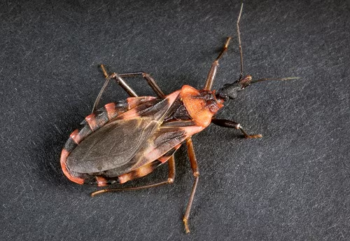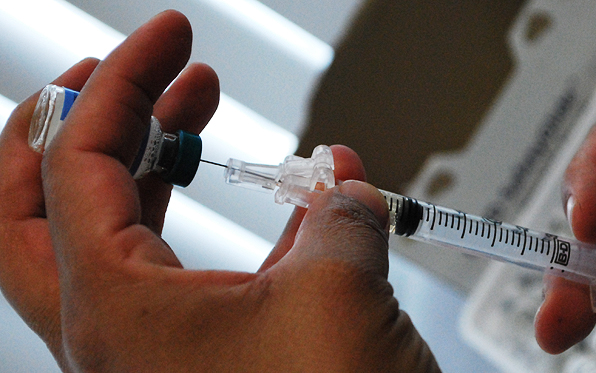County Supervisor Greg Cox, public health and environmental health officials held a West Nile virus prevention kickoff event Tuesday to remind the public that it’s time again for everyone to protect themselves against mosquitoes and the diseases they can spread.
Surrounded by “Fight the Bite” educational materials, mosquito-eating fish and real-life examples of where homeowners might find dangerous standing water around their homes, Cox and County Public Health Officer Dr. Wilma Wooten said mosquito-borne illnesses pose a health threat every year.
The event, centered on the County’s “Prevent, Protect, Report” message, was held at the County’s Provence House in Bonita.
“Prevent mosquitoes from breeding,” Cox said. “Find and dump out standing water…that might be around your homes. Mosquitoes can breed in the tiniest amount of water, especially our invasive Aedes mosquitoes that like to live in people’s backyards. So, find and dump out water under flowerpots, and in toys and gardening equipment that may be left out in the yard.”
Cox said the County’s Vector Control Program continues to work hard to protect the public from mosquitoes and mosquito-borne illness, primarily West Nile virus—which in rare cases, can be deadly.
In addition to trapping and monitoring mosquito populations, Vector Control educates the public, gives away free mosquito-eating fish, treats more than 1,400 potential mosquito-breeding sites every year by hand, and has used helicopters for years to drop solid, granular larvicide on 48 local waterways inaccessible to hand crews roughly once a month during mosquito season.
Vector Control is scheduled to conduct its first helicopter larvicide-drop Wednesday, April 17, weather permitting. The larvicide is harmless to people and pets. But it kills mosquito larvae before they can grow into biting mosquitoes that can transmit disease to people if they feed on infected animals and then bite people.
County Public Health Officer Dr. Wilma Wooten said that West Nile virus poses a public health threat every year although it has been largely held in check in recent years. Over the last two years, three San Diego County residents tested positive for the disease and all survived. But as recently as 2015, 44 San Diego County residents tested positive for West Nile virus and six of those people died.
Wooten said 80 percent of people who become infected with West Nile virus never suffer any symptoms at all and most of the remaining 20% suffer mild flu-like symptoms. In rare cases, however, Wooten said, West Nile virus can be deadly.
Wooten said San Diego County is also home to invasive Aedes mosquitoes that like to live in people’s yards and home and that can—under the right circumstances—spread tropical diseases not normally found here, like Zika, dengue and chikungunya. Wooten said that could happen when San Diego County residents travel to countries where tropical diseases are established and return home infected. Local invasive Aedes mosquitoes can then feed on those infected people and pass the tropical disease on to others here.
“So, it is extremely important,” Wooten said, “that we all protect ourselves from mosquitoes—here and when we travel to other countries.”
Prevent mosquito breeding
Dump out or remove any item inside or outside of homes that can hold water, such as plant saucers, rain gutters, buckets, garbage cans, toys, old tires, and wheelbarrows. Mosquito fish, available for free by contacting the Vector Control Program, may be used to control mosquito breeding in backyard water sources such as unused swimming pools, ponds, fountains and horse troughs.
Protect yourself from mosquito bites
Protect yourself from mosquito-borne illnesses by wearing long sleeves and pants or use repellent when outdoors. Use insect repellent that contains DEET, picaridin, oil of lemon eucalyptus, or IR3535. Make sure screens on windows and doors are in good condition and secured to keep insects out.
Report possible mosquito activity
Report increased mosquito activity, or neglected, green swimming pools and other mosquito-breeding sources, as well as dead birds — dead crows, ravens, jays, hawks and owls — to environmental health’s Vector Control Program by calling (858) 694-2888 or emailing vector@sdcounty.ca.gov. Also report if you are being bitten by mosquitoes during daylight hours, or if you find mosquitoes that match the description of Aedes mosquitoes by contacting the Vector Control Program at (858) 694-2888.
For more information about mosquito-borne illnesses, go to San Diego County’s “Fight the Bite” website.
Here are some tips to help keep your yard from becoming a mosquito breeding ground.





